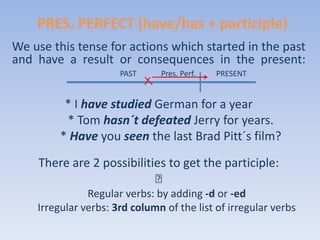
Pres. perf. with ever,never,already,just,yet,still
- 1. PRES. PERFECT (have/has + participle) We use this tense for actions which started in the past and have a result or consequences in the present: PAST Pres. Perf. PRESENT * I have studied German for a year * Tom hasn´t defeated Jerry for years. * Have you seen the last Brad Pitt´s film? There are 2 possibilities to get the participle: Regular verbs: by adding -d or -ed Irregular verbs: 3rd column of the list of irregular verbs
- 2. EVER * Have you ever ridden a motorbike? (INT.: you want to know if something has happened = BEFORE THE VERB) NEVER * I have never climbed the Mont Blanc (NEG. meaning: you say that something hasn´t happened = BEFORE THE VERB)
- 3. ALREADY * I have already finished the English task (AFF.: you have done the task sooner than expected = BEFORE THE VERB) JUST • Sue has just left to school (AFF.: she left a few seconds or minutes ago = BEFORE THE VERB)
- 4. STILL * They still haven´t woken up (NEG.: the action hasn´t happened for the moment = BEFORE THE AUX.) YET * Peter hasn´t asked me out yet (NEG.: the action hasn´t happened for the moment = AT THE END OF THE SENT.) * Has John split up with his girlfriend yet? (INT.: you want to know if the action has happened = AT THE END OF THE SENT.)
- 5. POSITION SENTENCE MEANING EVER Before the V AFF./INT. The best seen or want to know NEVER Before the V NEG. Not done ALREADY Before the V AFF. Done JUST Before the V AFF. Done a moment ago STILL Before the AUX NEG. Not done YET At the end NEG./INT. Not done or want to know